Steelworkers Discuss Way Forward for
the Workers' Movement
• The Inadequacies of Our Present System of
Government
• NDP Leader Addresses Steelworkers' Thursday
Meeting in Hamilton
Interview
• Fight of Maritime Workers Against Neo-Liberal
Free Trade
Agreements - Jim Given
Steelworkers Discuss Way Forward for the
Workers' Movement
The Inadequacies of Our Present
System of Government
For years workers have tried to pressure politicians to
defend workers' rights. Inevitably some excuse comes up and workers
are deprived of their rights. Workers have even had laws passed to
protect their pensions but those laws have been ignored or
violated. They have fought for collective agreements only to have the
state intervene with instruments such as the Companies'
Creditors Arrangement Act (CCAA) that deprive them of the
protections and benefits within their collective agreements.
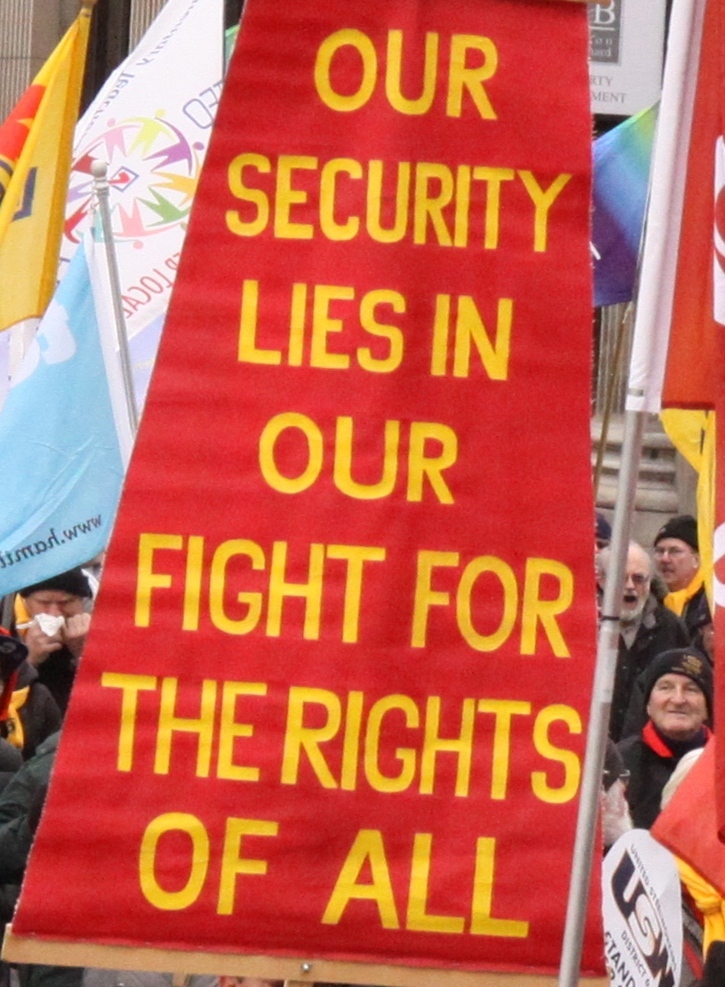
This shows that workers
have to confront with an open mind the inadequacies of our present
system of government.
Steelworkers are in a fight to defend their rights. If
steelworkers
say that rights depend on electing this or that politician
or if they denounce this or that political party or individual, how is
this going to move the struggle forward? Steelworkers'
rights exist objectively whether any politicians or parties recognize
them or
not. The defence and affirmation of rights can only rely on
workers themselves and their own efforts to organize their peers and
build their own institutions and media. The defence of
rights, pensions, OPEBs, jobs and standard of living cannot rely on any
politicians other than workers themselves, and cannot rely
on the existing political process that has shown itself to be
completely dysfunctional and against the interests of workers.
Steelworkers have first and foremost the right to
conscience. That right to conscience exists within our thought process
and how we express ourselves. Saying steelworkers must be represented
by those who rule over them to defend their rights and the rights of
all is an anachronism. Declaring that the only way to defend their
rights is to mobilize people to vote for politicians and trust them to
make the right decisions is not an affirmation of their right to either
conscience or to govern themselves.
Local 1005's program is to defend the rights of its members, pensioners
and other workers in Hamilton and to find a way forward for the steel
industry and economy. The fact is that today trade unions are no longer
appendages of the cartel parties vying for political power. Like Local
1005 USW they must be instruments to defend the rights of their
members, the community, economy and the rights of all.

NDP Leader Addresses Steelworkers' Thursday Meeting in
Hamilton

On Thursday, January 19 Local 1005 USW invited NDP
leader Thomas
Mulcair to address their Thursday meeting and answer
workers' questions. President Gary Howe thanked Mulcair for coming to
Hamilton to hear their concerns directly. Gary also thanked
Hamilton area MP Scott Duvall for organizing the January 19 visit. He
also extended thanks on behalf of the Local for the
attendance of Hamilton East MPP Paul Miller and Hamilton Mountain MPP
Monique Taylor.
Gary said Local 1005 has consistently held Thursday
meetings since 2003 when Stelco was preparing to enter bankruptcy
protection under the Companies' Creditors Arrangement Act
(CCAA). At that time the Local recognized CCAA as legalized theft
of what rightly belongs to steelworkers, retirees and others and this
view has not changed today in 2017 with Stelco once again
under CCAA. This is the central concern workers want to raise with Tom
Mulcair, Gary said.
Before answering four questions prepared by Local 1005,
Mulcair briefly conveyed his party's support for steelworkers and
retirees in their current struggle under CCAA. Mulcair was critical of
the CCAA saying very few developed countries have similar
bankruptcy laws that "leave workers behind, where the value produced by
labour is emptied out by the courts. Priority has to be
given to the workers, their pensions and benefits under the CCAA.
Workers have to come first."
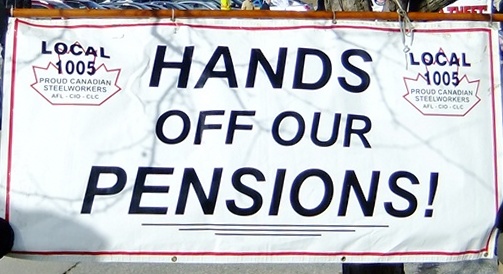 In 2005, the Liberal
minority government of Paul Martin pushed Bill C-55 -- said to put the
interests of workers first when
under bankruptcy protection -- through the House of Commons. However,
Bill C-55 in no way changed the CCAA to give priority to
workers, their pensions and benefits or allow them to come first in the
bankruptcy process. Despite this, the bill was supported
by the NDP in the name of high ideals. But as Local 1005 pointed out at
the time, Bill C-55 made the CCAA an even more criminal
and powerful state-organized weapon of legalized theft of what belongs
to workers by right. It was pushed through to take the
initiative out of the hands of the workers themselves. It was
specifically designed to counter the staunch resistance of Local
1005 under CCAA in 2004 to any attempts to open its collective
agreement. The oligarchs wanted more legal power to steal what
belongs to workers. Bill C-55 gave a presiding judge the power to force
a local union to open its contract under CCAA.
In 2005, the Liberal
minority government of Paul Martin pushed Bill C-55 -- said to put the
interests of workers first when
under bankruptcy protection -- through the House of Commons. However,
Bill C-55 in no way changed the CCAA to give priority to
workers, their pensions and benefits or allow them to come first in the
bankruptcy process. Despite this, the bill was supported
by the NDP in the name of high ideals. But as Local 1005 pointed out at
the time, Bill C-55 made the CCAA an even more criminal
and powerful state-organized weapon of legalized theft of what belongs
to workers by right. It was pushed through to take the
initiative out of the hands of the workers themselves. It was
specifically designed to counter the staunch resistance of Local
1005 under CCAA in 2004 to any attempts to open its collective
agreement. The oligarchs wanted more legal power to steal what
belongs to workers. Bill C-55 gave a presiding judge the power to force
a local union to open its contract under CCAA.
The NDP voted to include the following clause in Bill
C-55:
"65.12 (1) [A debtor company considered a person under
commercial
law] who is a party to a collective agreement and who is
unable to reach a voluntary agreement with the bargaining agent to
revise any of its provisions may, on giving five days notice to
the bargaining agent, apply to the court for an order authorizing the
insolvent person [company] to serve a notice to bargain
under the laws of the jurisdiction governing collective bargaining
between the insolvent person [company] and the bargaining
agent." This additional state-organized threat and weapon now hangs
over the head of all union locals under CCAA.
The bankruptcy process does not consider alternate
proposals for a
company under CCAA. It concerns itself narrowly with the
restructuring of existing assets, which becomes a dogfight between the
most
powerful to seize control. The health of the economy in
which the company operates and its relationship to that economy and
community and the rights of workers are not a concern of CCAA.
This invariably means no new direction is discussed, allowed or
attempted, workers lose what belongs to them by right and the
fundamental problems facing the company and sector continue or are
papered over and not addressed.
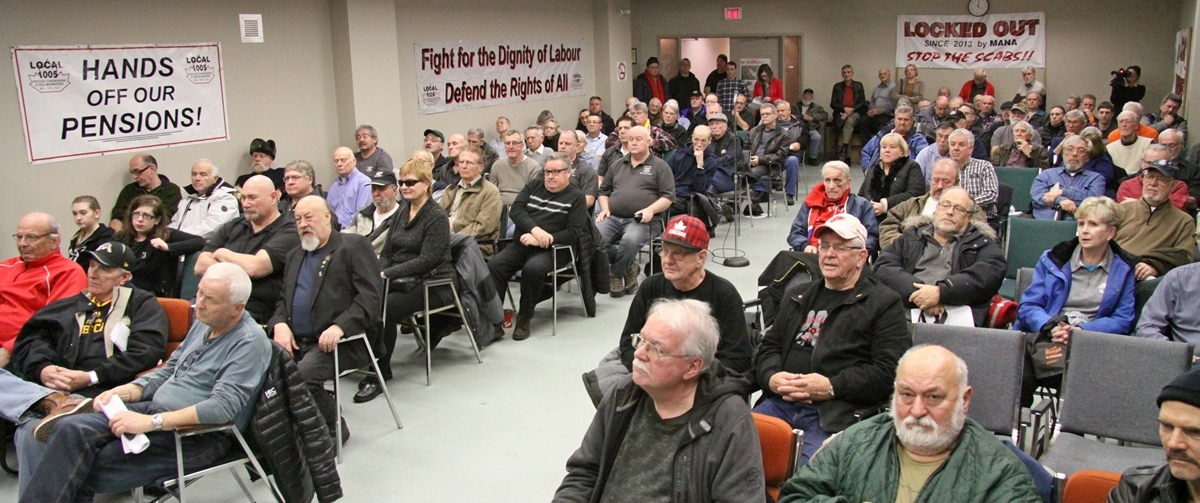
The Local 1005 executive prepared the following
four questions for Mulcair:
1. "The company is allowed to remain under bankruptcy
protection even though it is rolling in cash. This is why we say the
CCAA is legalized theft. How can the judge take benefits away from
pensioners when the company has over $200 million cash on
hand?"
Mulcair:
Benefits are wages workers forgo. The benefits are wages put aside for
later in life. People like you cannot be left
behind. Hold Bratina to account. [Bob Bratina is Liberal MP for
Hamilton East-Stoney Creek and former Hamilton Mayor. It must be
noted that Bratina as Mayor or MP has never publicly attacked
steelworkers or Local 1005 and has in fact attended many of its
rallies.]
2. "With the first secret deal, the hedge funds made
$1.2 billion dollars. [Sale of Stelco to U.S. Steel in 2007 approved
under the Investment Canada Act ] USS committed to definite
levels of production, employment and to fund the pension
plans. A USS CFO put in writing that the pension plans were safe with
USS. The Investment Canada Act
is not taking care
of us. Where is the net benefit for hourly and salaried workers, the
city and environment? The provincial representative of FSCO
(Financial Services Commission of Ontario) repeatedly told us our
pensions were safe. Now their lawyers are telling us, it is none
of our business when we ask what is going to happen now that the
pension plans are underfunded by $800 million. 20,000 retirees
need their pensions and now they [Bedrock] plan to take them off the
balance sheet. What is to be done?
Mulcair:
Workers have to be protected first and foremost. What you are facing is
the new way of businesses. Vale bought Inco
and locked out its workers. It would not respect the existing contract.
The government did nothing. We are asking why pensions,
wages and benefits are not protected.
Duvall:
I tried to get answers about the secret deal [under the Investment
Canada Act
]. I went to McQuade [U.S. Steel
Canada President] and asked for permission to see the secret letter. He
said it was OK with him but we would have to get
permission from the federal government. When I asked them they said I
would have to get permission from USSC. We need to find out
how the government measures a deal to determine if it is a net benefit.
We have to get people on board, make sure workers come
first. The CCAA is like a cancer spreading across the country being
used to fleece workers. I can't even raise it in the Steel
Committee [in Parliament] which is focussing on trade. Nothing has
changed from the first CCAA [Stelco in CCAA 2004-06].
3. We have given a call for a public inquiry into the
CCAA. Under
it, workers have no rights. Any attempts to launch human
rights complaints are stayed. The government criticises other countries
for their lack of human rights while they are taking away
ours. It is legal to take away our deferred wages. The company has the
money but it does not want to restore our benefits because
Bedrock does not want to take them on.
Duvall:
Even Dave Sweet [Flamborough-Glanbrook Conservative MP]
signed on for a public inquiry. A judge can take away benefits
from pensioners at the same time as he allows the company to give
managers bonuses. And the judge allows the company to get out of
paying city taxes. The public inquiry has to be worked on. The Liberals
need to be asked if they are on board.
Miller:
I have been after both governments for years about the
CCAA. We need to get thousands onto Parliament Hill and in
front of Queen's Park. Stand up en
masse. Get our sisters and brothers
across the country to stand up and demand that the Liberals
have to give answers. We need to change the government.
4. The CCAA was enacted in 1933 to help companies
restructure so they would stay in business. Now it is being used to
extort
the earnings of the workers. How can it be changed to be used for its
original purpose?
Duvall:
It's the great Canadian train robbery to steal money out of this
country to another. The law has to be rewritten so
that the money can't go to another country. Thanks for inviting us, we
have to go.
Mulcair:
I like the idea of getting a mass action on Parliament Hill. It will
make a strong statement on the CCAA. It's the
right time. There are allies across the country. Workers in Quebec are
facing the same thing.
After this exchange, discussion with the invited guests
was cut off abruptly at
4:30 pm as Mulcair and Duvall who arrived at 3:50 pm said they had
another commitment.
Comments from the Floor
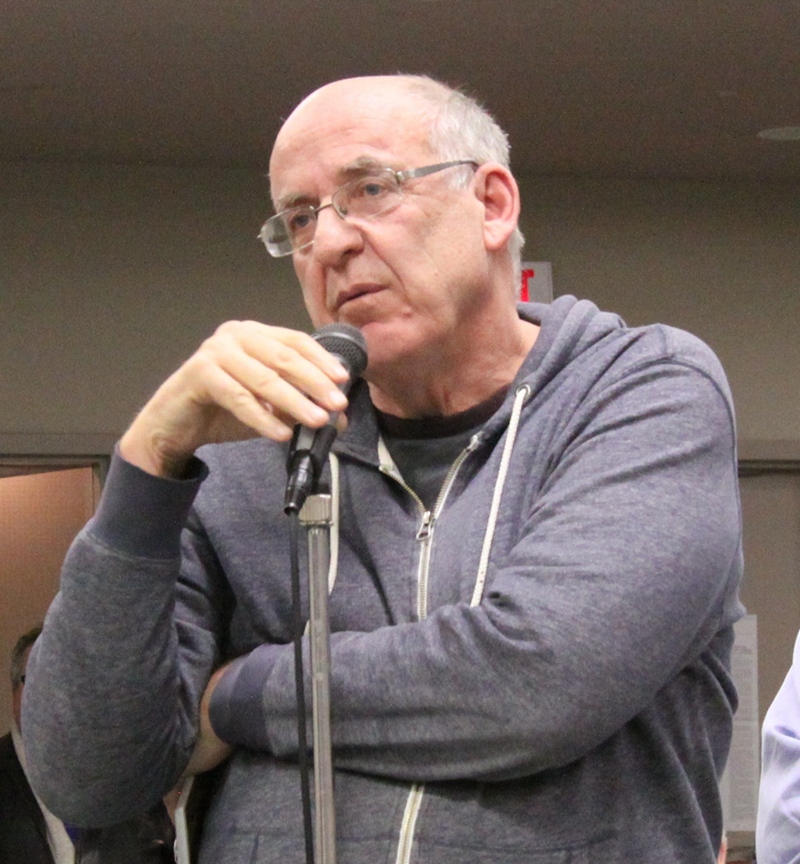 Rolf Gerstenberger, retired
President of Local 1005 said that since 2004, the workers have
recognized the CCAA as legalized
theft. None of the political parties in elected positions took this
issue up. Some said we need to change the legislation. When
the need to change the legislation to put workers first was discussed
in the Senate, senators and big business lobbyists opposed
the idea saying if workers came first under bankruptcy then global
companies would refuse to invest in Canada and the economy
would suffer.
Rolf Gerstenberger, retired
President of Local 1005 said that since 2004, the workers have
recognized the CCAA as legalized
theft. None of the political parties in elected positions took this
issue up. Some said we need to change the legislation. When
the need to change the legislation to put workers first was discussed
in the Senate, senators and big business lobbyists opposed
the idea saying if workers came first under bankruptcy then global
companies would refuse to invest in Canada and the economy
would suffer.
For these characters the issue is to make the workers
suffer, not the business interests. To say that the only way the
financial oligarchs like Bedrock will invest in Canada is by making the
workers suffer is unacceptable, Rolf said. He said he
wanted to ask the invited speaker how we are going to deal with that
argument in Parliament. This is not just an issue for Local
1005. Workers are facing this legalized theft across the country. How
should they deal with this in the House of Commons and in
the country? It would have been good if the MPs who came had provided
the workers with some direction on this matter as they are
sitting in Parliament.
Local 1005 and others have raised the necessity of a
public inquiry
into this CCAA legalized theft. There is no indication of
a campaign in Parliament to make the matter a priority or to see how
the MPs
can use their positions to advance the cause. If an inquiry
is to begin, the full weight of the political establishment has to be
put behind it, which is not the case now even from those MPs
who say it should be done, Rolf pointed out.
Another worker pointed out that the CCAA was enacted
in 1933 and soon faded out of use until the 1980s when it began to be
used to attack the workers and strip them of everything they worked
for. The NDP supported Bill C-55, which was criminal in his
view. The change to CCAA allows a judge to force unions to open their
collective agreement before they expire to extract
concessions.
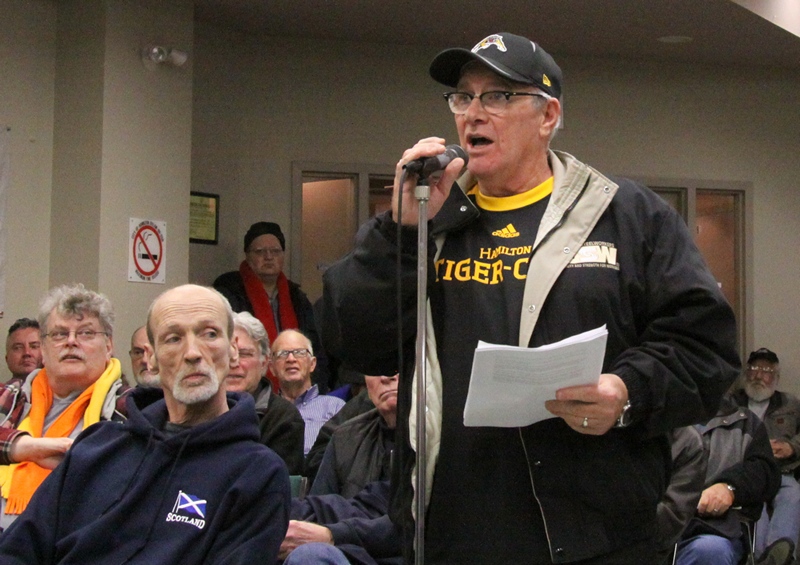
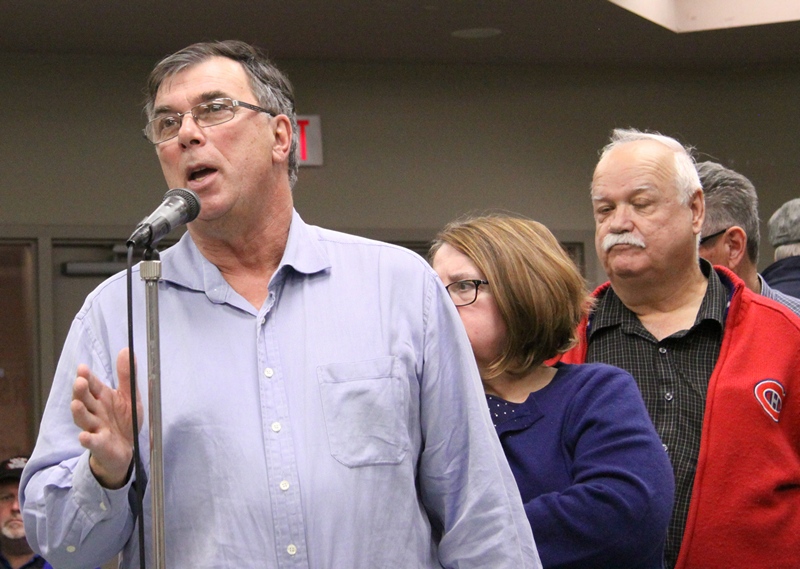
Since 1992, the provincial governments (NDP,
Progressive
Conservative and Liberal) have had a hand in the demise of our Stelco
pension plans, another worker pointed out. The province is legally
responsible if our plans are wound up without being made whole
and capable of paying the defined benefits, he said.
Another worker pointed out that Bedrock, the U.S.
company that wants to take over Stelco, says it will register Stelco as
a
Canadian holding company separate from its U.S. assets. Apparently, the
registration is to be in Delaware for tax and other
benefits. U.S. Steel registered Stelco as a separate company and has
used this farce to pretend that its investments in Stelco
were all loans that it now wants back through CCAA. "I wanted to ask
our guests what they propose to do about this farcical
arrangement, which stomps on our sovereignty as an independent
country," this worker said.
Another worker said he wanted to ask the guests what
they could do
about the proposed Bedrock underfunding of the cleanup and
environmental remediation of the Stelco lands. The $80 million spelled
out in the Bedrock PSA falls far short of the $300 million
the Province previously told U.S. Steel was not enough to do the job.
They should also be raising a stink about the Trudeau
Liberals' Bill C-27 to attack federal public sector defined-benefit
pensions, which forces workers to accept defined-contribution
"target" pension plans instead. These attacks on workers' rights to
defined benefits in retirement must be stopped!

Interview
Fight of Maritime Workers Against
Neo-Liberal Free Trade Agreements
"Now Is the Time for
Transportation Unions to Come Together
and Formulate a Plan and Solutions"
- Jim Given -
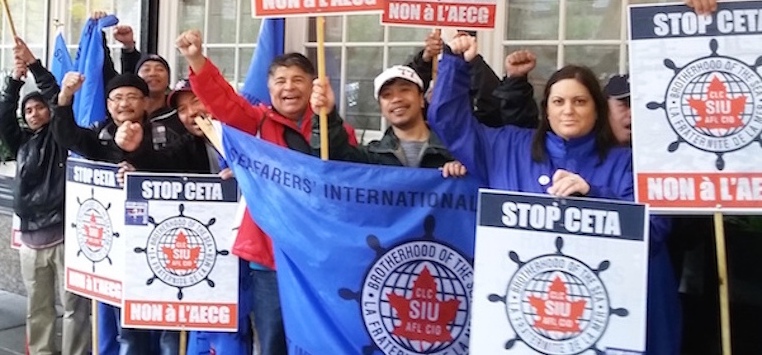
Maritime workers at Montreal demonstration against CETA, October 21,
2016.
|
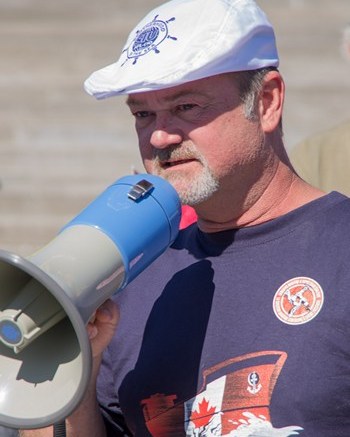
Jim Given, at Rally against CETA, Parliament Hill, September 27, 2014
|
Posted below is an interview with Jim Given, President
of the Seafarers' International Union of Canada (SIU). Maritime workers
are actively opposing neo-liberal free trade agreements such as the
Canada-European Union Comprehensive Economic and Trade
Agreement (CETA) as well as the deregulation and privatization of
transportation industries, including the maritime industry to
benefit global private interests. One example is the "Emerson Report,"
a report on the review of the Canada Transportation Act
commissioned by the Harper government in June 2014.
The committee
mandated to conduct the review was chaired by David
Emerson, a former member of the Harper cabinet.
The report
was tabled in Parliament on February 25, 2016 by Marc
Garneau, Minister of Transport in the Trudeau Liberal government. The
Trudeau government is considering implementing parts or all
of the Emerson Report which promotes all out deregulation and
privatization of Canada's transportation system and further
annexation of Canada to the adventures of global oligopolies for
empire-building and domination through the trade and energy
corridors.
***
Workers' Forum: Thank you for
speaking with Workers' Forum to
inform workers across the country about your fight. Please explain to
us the stand of the SIU
on the Canada Transportation Act Review Report, commonly called
the Emerson
Report, and on the consultations that were held by Transport Canada in
2016.
Jim Given: The Emerson Report, as
far as maritime transport is concerned, is totally flawed.
They talk about skills shortage at a time when the
unemployment
rate within the union is running at 11.25 per cent. There may
be a projected shortage of officers in the future but that is strictly
because Canada does not have a viable training program to
become an officer. If you want to become an officer you basically have
to either go without income for quite a while in order to
obtain it or you don't get it. They are creating their own skills
shortage when it comes to officers. I think the whole idea of
skills shortage works back into the government notion on trade. If you
look at some of the trade agreements, the Trade in Services
Agreement (TISA) is one of them that is coming which features a chapter
on labour mobility and that would include ship officers
within that labour mobility program.
The total elimination of cabotage within 7 years and
liberalization
of cabotage is totally ridiculous and there is absolutely
no need for it. That gets into the whole issue of the environment, of
security, of everything. If you want to get rid of cabotage,
you are killing a whole skills set in the country.
The consultation process was a joke. I was invited to
the round
table in Vancouver with Minister Garneau. There was myself
and CSL (Canada Steamship Lines) who were there from the domestic fleet
side. Everybody else was from import-export and they were
quite happy to liberalize the industry. When the draft report came out
and CSL and I were the only ones to stand up for domestic
shipping, none of our comments were included in the draft report. They
had to change it because we complained that they had to
include our comments on domestic shipping. I give them credit for going
through the exercise but that is not what I consider a
consultation process.
As far as the privatization of ports is concerned, we
work quite closely with the longshore unions that are part of the
coalition that we got together to try to maintain what we have. I look
at this in the big picture and I keep going back to
different things that we are dealing with when it comes to trade. In
order to have free trade, not fair trade, you have to
deregulate. Privatizing ports is a form of deregulation. It has never
worked in favour of labour in other countries where it has
been done and that goes for cabotage and privatization of ports.
It does not work within our industry and our industry
is the poster
child for globalization, as you know. We live on trade,
without trade there is no shipping industry. We are in favour of trade
but it has to be fair trade not free trade where you
deregulate and liberalize the industry within your country. They keep
talking to us that this is about reciprocity. There is no
reciprocity for the Canadian fleet. We can't take our ships that are
purpose-built for the Great Lakes-St. Lawrence Seaway and the
Coast and start running in deep seas. The Emerson Report also talks
about a Canadian Second Registry which is another fancy name
for Flags of Convenience. Norway, Denmark, UK, have Second Registry.
You take Norway, there are no Norwegians on this registry, it
is all flags of convenience. They also keep claiming that it will make
things cheaper, that it will drive down the costs if
foreign carriers have access to the Canadian market. The reason they
are pushing it so hard now is because freight rates on the
outside are low. If they drive out Canadian domestic shippers they are
going to raise the price. You cannot rely on a foreign
carrier for your domestic cargo, because at any given time they can
leave, whereas the Canadian ship owners, the Canadian base, they
want to be here. Their ships are made for here, their ships are made to
serve that market.

There are things to look at in the Canadian shipping
industry and
the Canadian supply chain. There are certain things you can
change, that you can streamline when it comes to some of the fees that
are imposed, but not the cabotage aspect. We have in
place right now the ability that if there is no Canadian ship you can
bring a foreign ship to do the job. That ability is there,
there is no need to open it any further. They say it is protectionism
on our part. None of it is protectionism. It is simply the
right to work in your own country. With CETA there are thousands of
jobs that are going to be lost. TISA would go further and with
the Emerson Report it would be 13,000 seafarers alone that are gone
and then you have to look at what happens with the ports'
privatization. It is an industry that directly and indirectly supports
250,000 jobs in Canada.
That would be the end of domestic shipping.
I do not believe in coincidence. When I am looking at
CETA, at
TISA, at what happens with the Ukraine Trade Agreement, it is
not coincidence how these papers were formulated. They were
formulated for deregulation and liberalization in order to fit into
the corporate globalization that is going on around the world. It was
worded to get more freedom for corporations on how they are
going to run the country not the little guy. How are you going to run a
country when everyone is making $11 an hour? They are
saying that the tax base is going to come from the corporations. Look
at Hamilton. U.S. Steel left, they took $18 million worth of
tax revenue out of Hamilton. Who is going to replace that 18 million?
The guy who works at Tim Hortons?
Deregulation in the shipping industry does not work. It
just creates more flags of convenience. Canada needs a strong merchant
marine, for our own security, for environmental reasons, we have to
develop a policy.
WF: What work is SIU doing at this
time to oppose this deregulation and privatization?
JG: We work to educate the public
on the
importance of our industry. This industry could be a job creator in
Canada. Then we will continue to look after the environment, get
a Canadian flag fleet that has adapted so they are environmentally
friendly or are getting there. We have to educate the public, educate
the politicians, sit down and have meaningful discussion
with policy makers on how we carry the industry forward to keep it
relevant and viable.
We consider ourselves as the drivers. We spend so much
time in our
union to educate ourselves on what these policies mean and
the effect they have. We are working with the ship owners and the other
unions to develop policies. We are at a crossroads. We are
either successful or our industry dies. But it is not doom and gloom.
It is actually an opportunity to sit down and create a
policy that will maintain our industry for decades to come.
Talking to the people within government we can see that
a good number of them do not know our industry. Ours is a ghost
industry because we never went for government subsidies, government
help. We are self-sustaining. They are not aware that 90 per
cent of everything they touch everyday comes on ships. And these are
the people who are in charge of our future! We are truly a
ghost industry even within government.
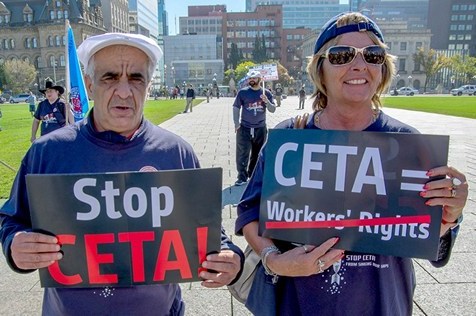
We are not about to be ignored. We consider ourselves
as being reasonable when it comes to this industry but if we are
ignored
we are going to get down on the streets. We made that clear to the
politicians that if they want to ignore us they are going to
have a hell of a battle on their hands. Our members believe in what
they do and take pride in their industry.
I had a meeting recently with the Canadian Labour
Congress (CLC).
We were able to get, for one of the first times in a very
long time, all of the transport unions in one room; airlines, rail,
trucks, maritime. Everyone was there and the Emerson Report
was a big topic of discussion. We agreed that we have to keep the
transportation sector within the CLC going, exchange our ideas,
which we have not done in a long time, and formulate plans. With
everyone under the gun, all of us when it comes to
transportation, now is the time those unions are going to come
together, formulate a plan and solutions to take to the government
people and I hope they are going to listen. I think they are going to
listen.
I am also Chair of the International Transport Workers'
Federation
(ITF) Cabotage Task Force. Our work is to support countries
that want to strengthen their cabotage and develop it. Our Cabotage
Task Force goes a lot into things like the Emerson Report
because as a world industry I take that report back to the task force
to see what other countries have done to fight similar
legislation. I see a lot of similarities. We look at CETA. We are still
working at defeating CETA within Europe. With the Cabotage
Task Force unions we are figuring out what countries we can influence
to turn it down. We are still hopeful to defeat it in
Europe. Even in Canada, since it has come through Parliament with C-30
[the bill before Parliament to implement CETA], there are
Senators, because of what we have done in the press and everything, who
want to know when it goes to the Senate how it is going to
affect Canadian shipping. This is far from over.






